The disruptive effect of a mango. Giving a voice to the unexpected in the study of the intercultural
Titolo Rivista MONDI MIGRANTI
Autori/Curatori Sara Amadasi
Anno di pubblicazione 2022 Fascicolo 2022/2
Lingua Inglese Numero pagine 15 P. 189-203 Dimensione file 168 KB
DOI 10.3280/MM2022-002009
Il DOI è il codice a barre della proprietà intellettuale: per saperne di più
clicca qui
Qui sotto puoi vedere in anteprima la prima pagina di questo articolo.
Se questo articolo ti interessa, lo puoi acquistare (e scaricare in formato pdf) seguendo le facili indicazioni per acquistare il download credit. Acquista Download Credits per scaricare questo Articolo in formato PDF

FrancoAngeli è membro della Publishers International Linking Association, Inc (PILA)associazione indipendente e non profit per facilitare (attraverso i servizi tecnologici implementati da CrossRef.org) l’accesso degli studiosi ai contenuti digitali nelle pubblicazioni professionali e scientifiche
This paper investigates the process of constructing the self and the other in a field-work experience. In analysing some storified excerpts from the author’s ethno-graphic notes, the concepts of narratives, small culture formation and the intercul-tural are applied. Narratives and small cultures can be used to rethink the role of the researcher, as they permit focusing on the observation as a process of narrative construction. Additionally, it is based on small cultures involving both the re-searcher and the participants that this process takes shape. The concept of the in-tercultural, as applied to this work, aims to challenge the essentialist, established view of culture in its association with national belonging to focus on the negotia-tion of meanings that construct culture. What the author finds is that in these ne-gotiations, each social actor engages with a set of personal narratives that come into play according to contextual needs and their resonances with other participants.
Questo articolo indaga il processo di costruzione del sé e dell’altro in un’esperienza di ricerca sul campo. Nell’analisi di estratti tratti dalle note etnografiche dell’autore, vengono applicati i concetti di narrazioni, formazione di small cultures e di interculturale. Le narrazioni e le piccole culture consentono di ripensare il ruolo del ricercatore, permettendo di concentrarsi sull’osservazione come processo di co-struzione narrativa. Questo processo si basa su piccole culture transitorie che coin-volgono sia il ricercatore che i partecipanti. Il concetto di interculturale applicato in questo lavoro mette così in discussione la visione essenzialista della cultura nella sua associazione all’appartenenza nazionale, concentrandosi sulla negoziazione dei significati che costruiscono la cultura. Secondo l'autore in queste negoziazioni ogni attore sociale s’impegna con narrazioni personali scelte in base alle esigenze di contesto e le risonanze generatesi con gli altri partecipanti.
Parole chiave:narrazioni; interculturale; small cultures; etnografia; non-essenzialismo, migrazione.
Sara Amadasi, The disruptive effect of a mango. Giving a voice to the unexpected in the study of the intercultural in "MONDI MIGRANTI" 2/2022, pp 189-203, DOI: 10.3280/MM2022-002009